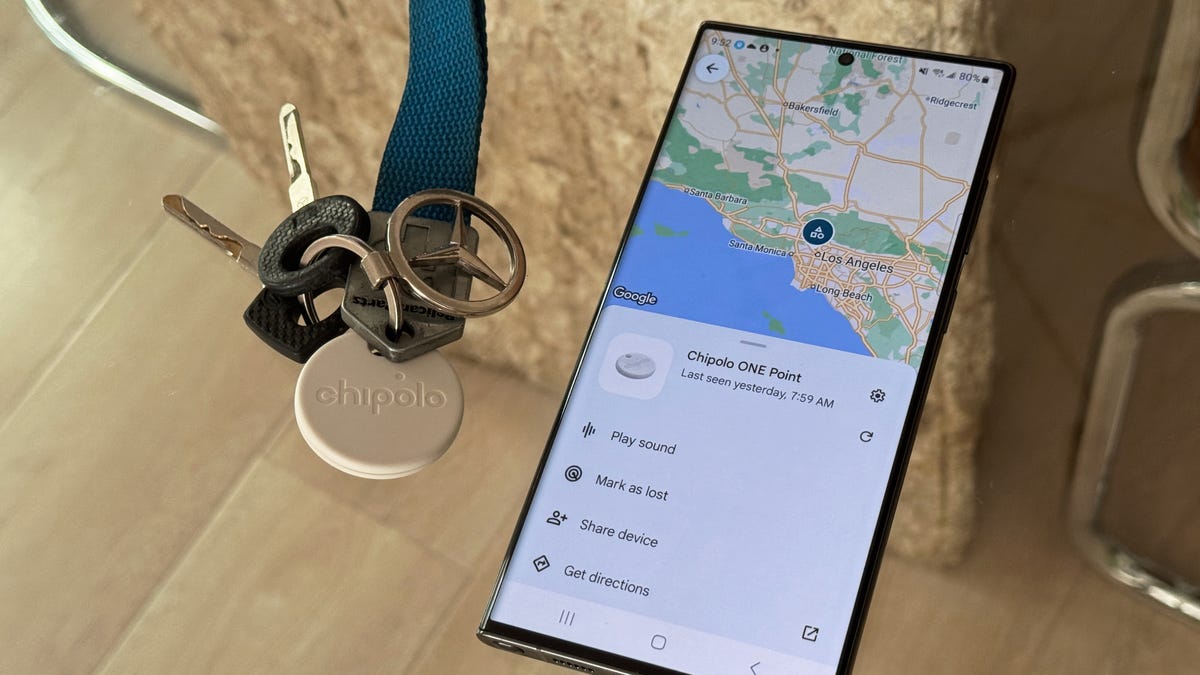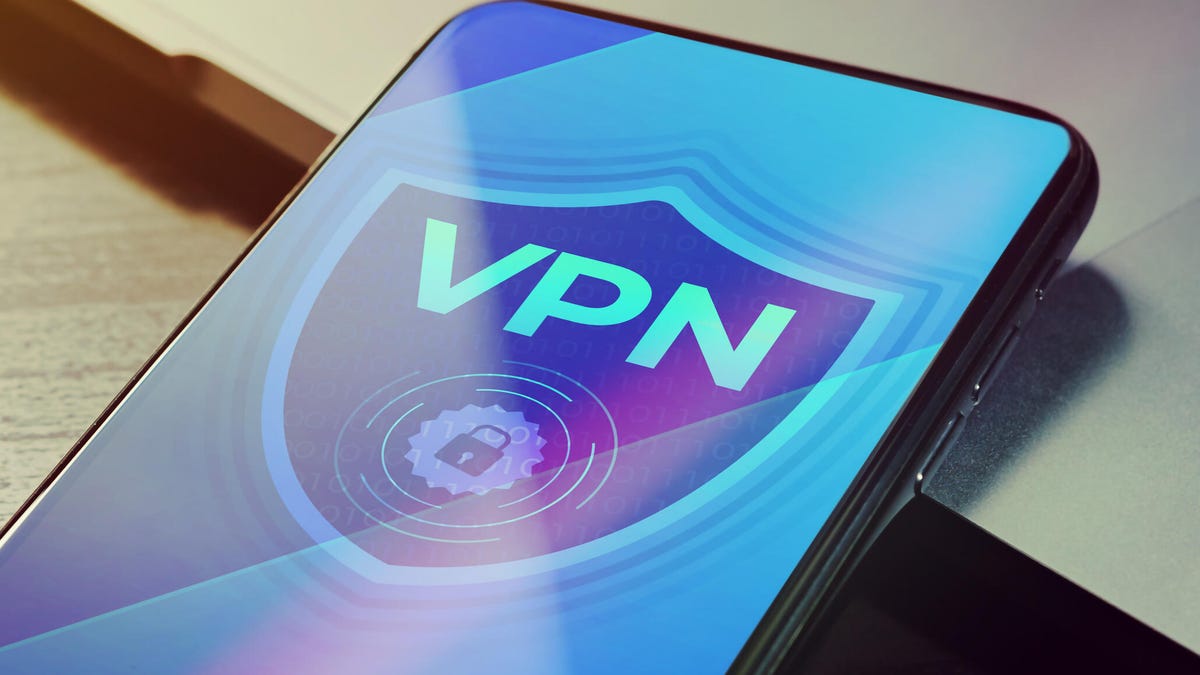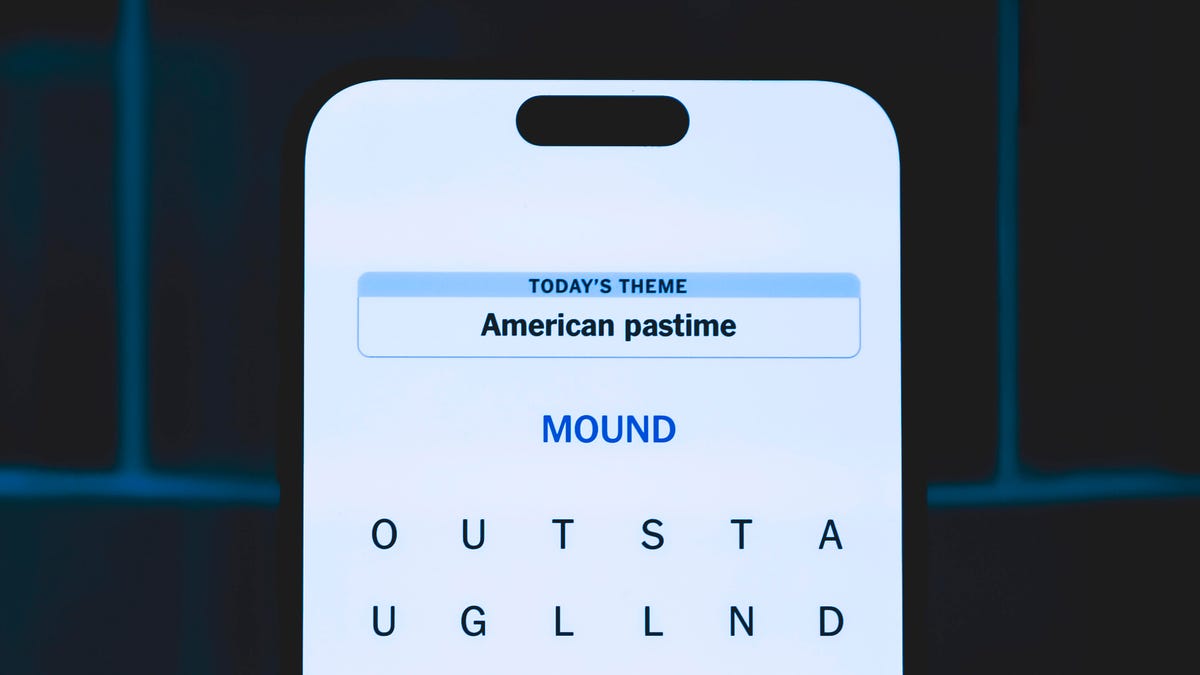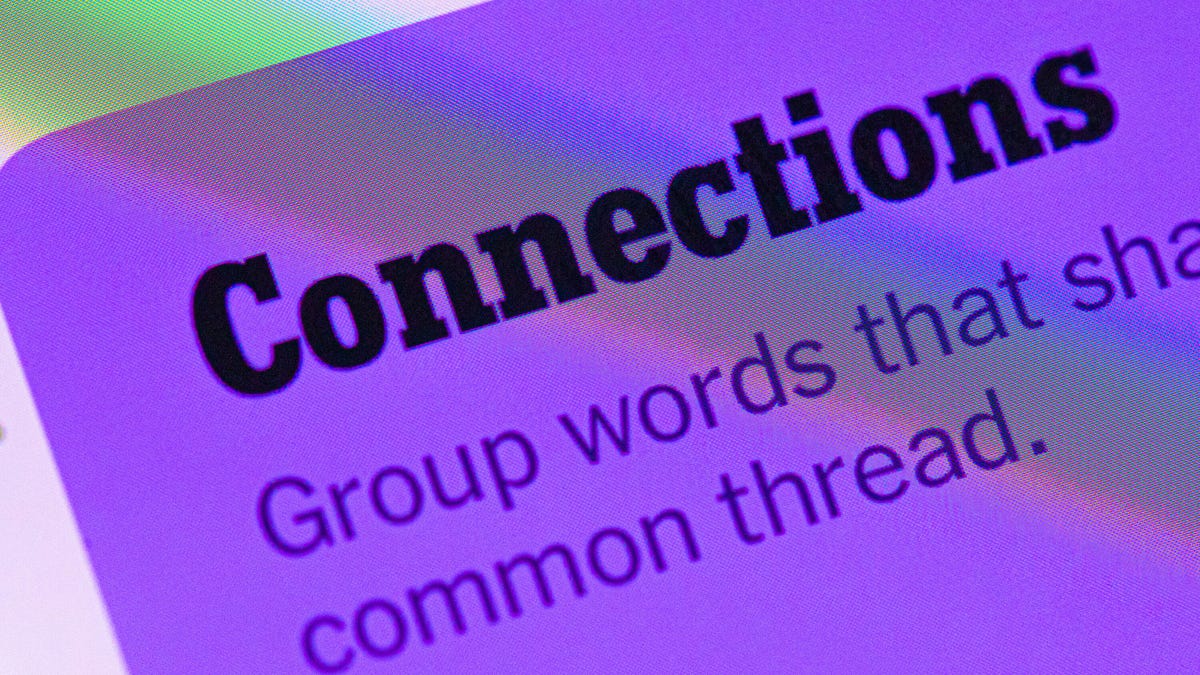Technologies
I Prefer These Bluetooth Trackers Over AirTags. Here’s Why I’m Grabbing Even More With This Early Prime Day Deal
Apple’s AirTags are pretty great, but only if you’re an iPhone user. For Android users, I recommend the Chipolo One Point, which is down to an all-time low price right now.

Apple’s AirTags Bluetooth trackers are a popular choice among our CNET staff for tracking everything from keys to wallets, and even bikes and cars. But if you’re an Android user (like me), there’s no point in wasting money on something that’s incompatible. Luckily, Apple isn’t the only company that makes Bluetooth trackers, and I’ve found some options for Android users that are just as good. I especially like the One Point, which Chipolo released in 2024.
Amazon’s October Prime Day sale (aka Prime Big Deals Day) officially kicks off on Tuesday, Oct. 7, but our editors have already spotted some worthwhile discounts, including an early deal on Chipolo’s trackers. Right now, a four-pack of the One Point trackers is down to an all-time-low price of $62, or $15.50 per tracker. That’s 22% less than its usual list price of $79 for a four-pack. And it’s $13 less than the current sale price of Apple’s AirTags.
The One Point is a Bluetooth tracker that uses Google’s own crowdsourced Find My Device network of over 1 billion Android devices. It works in a similar way to Apple’s Find My network to help you easily locate your keys, wallet, luggage, backpack, car or other items that are easy to misplace.
Taking advantage of Google’s tracking network means besides using your own phone to locate the One Point tracker — with the Find My Device app — you can tap into all the other Android devices around you, from friends and strangers alike (completely privately), to better track your item, no matter where it is or how far from the item you are. (For more, here’s why you shouldn’t put an AirTag on a pet and five unexpected places to use a tracker.)
Hey, did you know? CNET Deals texts are free, easy and save you money.
How does the Chipolo One Point tracker work?
The tiny plastic tracker, which weighs relatively nothing, is about an inch and a half in diameter, roughly the size of those old Eisenhower dollar coins (I’m showing my age). Unlike the Apple AirTag, the One Point also has a built-in keyring hole, so you don’t need to buy an accessory to clip the tracker to your item. All you need is a key ring.
Once your One Point is connected to your phone, you can check the location of your tracked item with Google’s Find My Device app. You can easily see where the tracker is on a map, and your distance from it. If you can’t find the tracker with your eyes, you can always force it to make a pretty loud sound (120db), so that you can easily hear where it is, even if it’s under a pile of clothing.
The battery life is about a year, but you can easily open the tracker (there’s a tiny hole on the side) to replace the CR2032 battery. You can buy a 10-pack of CR2032 batteries for $6, and Chipolo says that should last you a decade. If you’re placing your tracker on something shared, like a large piece of check-in luggage for you and your family, you can share the information with a loved one so that you can both keep an eye on the tracker from separate Android devices.
Taking advantage of Google’s tracking network means that besides using your own phone to locate the One Point tracker — with the Find My Device app — you can tap into all the other Android devices around you, from friends and strangers alike (completely privately), to better track your item, no matter where it is or how far from the item you are. Doing all that while saving money is just an added bonus.
Why should you get the Chipolo One Point over the AirTag?
There’s really only one reason why you should get the Chipolo One Point tracker, and that’s if you own an Android device. The Chipolo One Point is made specifically for Android phones and tablets and works with Google’s Find My Device app. If you own an Android, you definitely don’t want an AirTag, mainly because there’s no way to connect an AirTag to an Android device.
If you’ve got a mix of Apple and Android devices, there are also a few other reasons to choose the Chipolo One over an AirTag:
- The Chipolo One is cheaper than the AirTag. Only by a dollar, but still.
- The Chipolo One has a built-in key ring hole. The AirTag doesn’t have a key ring hole, so you’ll need to buy an accessory, which ends up making the AirTag a more expensive purchase.
- There is a card version of the Chipolo. The Card Point is a card tracker that’s specifically designed for your wallet. There is no AirTag card tracker at the moment.
How to set up your Chipolo One Point tracker
Right out of the box, all you need to do is press in your Chipolo One Point (you’ll hear a pretty loud sound coming from the tiny device) and then place the tracker next to your phone. Your Android device will automatically detect the tracker, as long as you have the Find My Device app downloaded.
The pop-up on your screen will walk you through all the instructions for setup, which includes linking the device to your email account, agreeing to be part of Google’s Find My Device network and enabling recent locations for offline devices.
All in all, the setup takes under a minute. And then you can keep track of your item from the comfort of your phone. Just don’t lose your phone.
Join Our Daily Deals Text Group!
Get hand-picked deals from CNET shopping experts straight to your phone.
By signing up, you confirm you are 16+ and agree to receive recurring marketing messages at the phone number provided. Consent is not a condition of purchase. Reply STOP to unsubscribe. Msg & data rates may apply. View our Privacy Policy and Terms of Use.
Technologies
Wisconsin Reverses Decision to Ban VPNs in Age-Verification Bill
The law would have required websites to block VPN users from accessing «harmful material.»

Following a wave of criticism, Wisconsin lawmakers have decided not to include a ban on VPN services in their age-verification law, making its way through the state legislature.
Wisconsin Senate Bill 130 (and its sister Assembly Bill 105), introduced in March 2025, aims to prohibit businesses from «publishing or distributing material harmful to minors» unless there is a reasonable «method to verify the age of individuals attempting to access the website.»
One provision would have required businesses to bar people from accessing their sites via «a virtual private network system or virtual private network provider.»
A VPN lets you access the internet via an encrypted connection, enabling you to bypass firewalls and unblock geographically restricted websites and streaming content. While using a VPN, your IP address and physical location are masked, and your internet service provider doesn’t know which websites you visit.
Wisconsin state Sen. Van Wanggaard moved to delete that provision in the legislation, thereby releasing VPNs from any liability. The state assembly agreed to remove the VPN ban, and the bill now awaits Wisconsin Governor Tony Evers’s signature.
Rindala Alajaji, associate director of state affairs at the digital freedom nonprofit Electronic Frontier Foundation, says Wisconsin’s U-turn is «great news.»
«This shows the power of public advocacy and pushback,» Alajaji says. «Politicians heard the VPN users who shared their worries and fears, and the experts who explained how the ban wouldn’t work.»
Earlier this week, the EFF had written an open letter arguing that the draft laws did not «meaningfully advance the goal of keeping young people safe online.» The EFF said that blocking VPNs would harm many groups that rely on that software for private and secure internet connections, including «businesses, universities, journalists and ordinary citizens,» and that «many law enforcement professionals, veterans and small business owners rely on VPNs to safely use the internet.»
More from CNET: Best VPN Service for 2026: VPNs Tested by Our Experts
VPNs can also help you get around age-verification laws — for instance, if you live in a state or country that requires age verification to access certain material, you can use a VPN to make it look like you live elsewhere, thereby gaining access to that material. As age-restriction laws increase around the US, VPN use has also increased. However, many people are using free VPNs, which are fertile ground for cybercriminals.
In its letter to Wisconsin lawmakers prior to the reversal, the EFF argued that it is «unworkable» to require websites to block VPN users from accessing adult content. The EFF said such sites cannot «reliably determine» where a VPN customer lives — it could be any US state or even other countries.
«As a result, covered websites would face an impossible choice: either block all VPN users everywhere, disrupting access for millions of people nationwide, or cease offering services in Wisconsin altogether,» the EFF wrote.
Wisconsin is not the only state to consider VPN bans to prevent access to adult material. Last year, Michigan introduced the Anticorruption of Public Morals Act, which would ban all use of VPNs. If passed, it would force ISPs to detect and block VPN usage and also ban the sale of VPNs in the state. Fines could reach $500,000.
Technologies
Today’s NYT Strands Hints, Answers and Help for Feb. 21 #720
Here are hints and answers for the NYT Strands puzzle for Feb. 21, No. 720.

Looking for the most recent Strands answer? Click here for our daily Strands hints, as well as our daily answers and hints for The New York Times Mini Crossword, Wordle, Connections and Connections: Sports Edition puzzles.
Today’s NYT Strands puzzle might be easy for those who pursue a certain hobby. Some of the answers are difficult to unscramble, so if you need hints and answers, read on.
I go into depth about the rules for Strands in this story.
If you’re looking for today’s Wordle, Connections and Mini Crossword answers, you can visit CNET’s NYT puzzle hints page.
Read more: NYT Connections Turns 1: These Are the 5 Toughest Puzzles So Far
Hint for today’s Strands puzzle
Today’s Strands theme is: The beer necessities.
If that doesn’t help you, here’s a clue: Cheers!
Clue words to unlock in-game hints
Your goal is to find hidden words that fit the puzzle’s theme. If you’re stuck, find any words you can. Every time you find three words of four letters or more, Strands will reveal one of the theme words. These are the words I used to get those hints but any words of four or more letters that you find will work:
- MALE, TREAT, STEAM, TEAM, MOVE, LOVE, ROVE, ROVER, SPEAR, PEAR
Answers for today’s Strands puzzle
These are the answers that tie into the theme. The goal of the puzzle is to find them all, including the spangram, a theme word that reaches from one side of the puzzle to the other. When you have all of them (I originally thought there were always eight but learned that the number can vary), every letter on the board will be used. Here are the nonspangram answers:
- HOPS, WATER, MALT, YEAST, BARLEY, SUGAR, WHEAT, FLAVOR
Today’s Strands spangram
Today’s Strands spangram is HOMEBREW. To find it, start with the H that’s three letters to the right on the top row, and wind down.
Technologies
Today’s NYT Connections Hints, Answers and Help for Feb. 21, #986
Here are some hints and the answers for the NYT Connections puzzle for Feb. 21 #986.

Looking for the most recent Connections answers? Click here for today’s Connections hints, as well as our daily answers and hints for The New York Times Mini Crossword, Wordle, Connections: Sports Edition and Strands puzzles.
Today’s NYT Connections puzzle features another of those purple categories where you need to look for hidden words inside of other words. It can be a real stumper. Read on for clues and today’s Connections answers.
The Times has a Connections Bot, like the one for Wordle. Go there after you play to receive a numeric score and to have the program analyze your answers. Players who are registered with the Times Games section can now nerd out by following their progress, including the number of puzzles completed, win rate, number of times they nabbed a perfect score and their win streak.
Read more: Hints, Tips and Strategies to Help You Win at NYT Connections Every Time
Hints for today’s Connections groups
Here are four hints for the groupings in today’s Connections puzzle, ranked from the easiest yellow group to the tough (and sometimes bizarre) purple group.
Yellow group hint: Rookies don’t have this.
Green group hint: Call the roll.
Blue group hint: How’d you do today?
Purple group hint: Vroom-vroom, but with a twist.
Answers for today’s Connections groups
Yellow group: Experience.
Green group: Attendance status.
Blue group: Commentary about your Connections results.
Purple group: Car brands plus two letters.
Read more: Wordle Cheat Sheet: Here Are the Most Popular Letters Used in English Words
What are today’s Connections answers?
The yellow words in today’s Connections
The theme is experience. The four answers are background, history, life and past.
The green words in today’s Connections
The theme is attendance status. The four answers are absent, excused, late and present.
The blue words in today’s Connections
The theme is commentary about your Connections results. The four answers are great, perfect, phew and solid.
The purple words in today’s Connections
The theme is car brands plus two letters. The four answers are audits (Audi), Dodgers (Dodge), Infinitive (Infiniti) and Minion (Mini).
-

 Technologies3 года ago
Technologies3 года agoTech Companies Need to Be Held Accountable for Security, Experts Say
-

 Technologies3 года ago
Technologies3 года agoBest Handheld Game Console in 2023
-

 Technologies3 года ago
Technologies3 года agoTighten Up Your VR Game With the Best Head Straps for Quest 2
-

 Technologies4 года ago
Technologies4 года agoBlack Friday 2021: The best deals on TVs, headphones, kitchenware, and more
-

 Technologies5 лет ago
Technologies5 лет agoGoogle to require vaccinations as Silicon Valley rethinks return-to-office policies
-

 Technologies5 лет ago
Technologies5 лет agoVerum, Wickr and Threema: next generation secured messengers
-

 Technologies4 года ago
Technologies4 года agoOlivia Harlan Dekker for Verum Messenger
-

 Technologies4 года ago
Technologies4 года agoiPhone 13 event: How to watch Apple’s big announcement tomorrow
